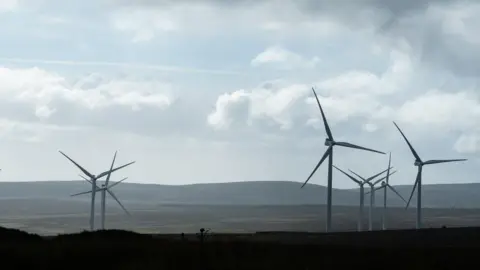Renewable energy: Stormont proposal could reduced bills
September 20, 2025
Renewable energy proposal could reduce bills
 NurPhoto/Getty Images
NurPhoto/Getty ImagesPeople living near renewable energy projects may get a discount on their electricity bills in future, under a proposal in a new Stormont scheme.
Known as the Renewable Energy Price Guarantee (REPG) scheme, it could also lead to lower electricity bills for all.
The REPG is designed to encourage investment in wind, solar and energy storage projects to help meet the goal of generating 80% of our energy from renewable sources by 2030.
Renewable sector leaders welcomed the announcement but added that “ambition must now be matched by delivery”.
‘Deliver lower costs’
Economy Minister Caoimhe Archibald said the scheme would “boost renewable generation and deliver lower electricity costs to households than they are paying today”.
She added that it would ensure local communities benefit from the transition to net zero.
The final scheme design, published by the Department for the Economy, acknowledges that the success of the 2030 target “will depend on the availability of a sufficient pipeline of renewable projects and the development of electricity infrastructure to support additional generation”.
Capacity limits in the electricity grid have led to wind power having to be switched off – known as “dispatching down” – to protect infrastructure.
Scheme will ‘power economic growth’
The chair of RenewableNI said the announcement would create jobs and attract investment, creating “stability” for consumers.
“It is one of, if not the, most directly beneficial actions the executive has taken to power economic growth here, particularly in rural areas,” said Tamasin Fraser.
“We’ve seen over the last numbers of years the impact that the war in Russia/Ukraine has had on bills by relying on imported fossil fuels.
“We can harness our own clean, green, indigenous resources and that will help hedge against that volatility.”
She added that reaching the 80% renewable generation target would deliver “approximately £110 million net benefit annually to the consumer”.
 RenewableNI
RenewableNIUnder the Programme for Government (2024-27), the Northern Ireland Executive has committed to supporting industry to increase renewable generation by another 40%.
The first auction to award generation contracts under the scheme will be held in early 2027.
It will aim to secure from 750 gigawatt hours per year to 1,250Gwh/year of power.
The price for that power will be agreed at the auction.
To fund the scheme, a fixed levy will be added to electricity bills under a new two-way payments’ system.
When prices drop below the agreed contract level, renewable energy generators will receive a payment from the electricity companies.
Conversely, when prices rise, excess payments will be collected from the generators, returned to the electricity companies and then passed on to consumers.
Over time, as renewable generation increases and fossil fuel dependence declines, this will result in lower and more stable electricity prices.
Ms Fraser said the sector was keen to work with the department and all involved “to ensure a clear, a timely implementation plan”.
She said that includes support for tackling grid constraints, planning delays and the lack of a policy framework.
Renewable power generation in Northern Ireland has stagnated in recent years, after peaking at 51% in 2022.
Only five new wind farms totalling 110MW have been connected in the past five years, compared to 400MW in 2016 under the previous support scheme.
The sector has repeatedly called for support to meet climate change targets.
A “community benefit” element for households near supported projects is to be explored by the DfE, similar to schemes already in place in the Republic of Ireland and Great Britain.
Search
RECENT PRESS RELEASES
Related Post




